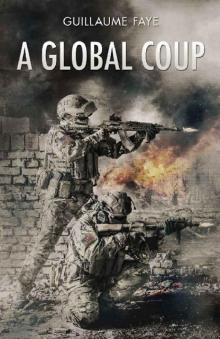A Global Coup, page 29




***
The strategic blunders that characterise the NAI and its warmongering have been perfectly described by American analysts. One of the best explanations regarding the NAI’s counterproductive stupidity was published in The New York Times on August the 20th 2003 and written by Maureen Dowd. In her article, entitled Magnet for Evil, she obviously alluded to the so-called Axis of Evil which Bush is bent on destroying. Her theory is that by attacking and then occupying Iraq, the USA has somehow created a new battlefield located at the heart of the Middle-East, towards which all fanatical Islamic jihadists now converge so as to ‘get even’ with the Americans. This development only serves to confirm France’s warnings.
Several analyses of this ilk have been published in the American press, which, in a customary fashion since the Vietnam war, always begins by expressing its approval of the White House’s adventurism, before hurling its horrified and affrighted criticism at the latter once failure has set in. I will now summarise the key points of the criticisms that were formulated in a dozen major American media outlets during the summer and autumn of 2003.
***
The Bush team has finally managed to create the very monster that it was supposed to keep at bay, a monster which had not existed until then, but is now as real as they come: Iraq. There was initially no connection whatsoever between Iraq and Al-Qaeda’s Islamic terrorism, regardless of the lies that were used to mobilise the American public opinion in support of the Iraqi war; this connection is now, however, very real indeed. Islamist warriors are now converging on Iraq from all corners of the world — Bush the idiot has done them a truly huge favour.
Maureen Dowd states:
Since America began its occupation, Iraq has become the mecca for every angry, hate-crazed Arab extremist who wants to liberate the Middle East from the “despoiling” grasp of the infidels. […] In yet another spun-up government document on Iraq, the White House listed 100 ways that things were going great in the 100 days we’ve been on the scene. The report burbled with gimcrackery about the “10 signs of better infrastructure” — days before an oil pipeline and then a water pipeline was blown up — and about soccer balls and science textbooks. “Most of Iraq is calm, and progress on the road to democracy and freedom not experienced in decades continues,” it said. “Only in isolated areas are there still attacks.” […] Even the Bush people, who tend to look at excruciatingly difficult problems and say no prob[lem], were shaken by yesterday’s carnage, which delivered a terrible truth: just because we got Uday and Qusay, Iraqi militants are not going to stop blowing up Westerners. Even if we get Saddam, the resistance will no doubt keep at it, hoping the dictator will enjoy the carnage from paradise.
On the 19th of August 2003, The Financial Times published an enquiry which revealed that more than 3,000 Saudi nationals had enlisted and gone to fight in Iraq against the coalitional forces, which clearly confirms Arabia’s fundamental hostility to an America that has naively viewed Saudi Arabia as its ally. The following idea surfaced: the 9/11 attacks had actually been motivated by the fact that Islamists could not tolerate the presence of US (Judeo-Crusader) troops on sacred Arabian soil. And despite this, the Bush administration’s thoughtless politicians decided to invade Iraq, another sacred Islamic territory, so as to eliminate terrorists! It is rather similar to having a doctor inoculate someone against an infection in their right arm, when the latter has actually ravaged the left. In the eyes of all these commentators, George Bush is guilty of being objectively allied to Islamic terrorism. None will ever ask themselves whether Bush has been manipulated, which is a simple feat considering his weak intellectual capacities, nor will they wonder whether America has long been intrinsically incapable of implementing an intelligent foreign policy and should not have remained isolationistic.
Just like the highly pro-governmental Washington Post, the American media have finally taken heed of the fact that America had ‘not only triggered terrorism’ in Iraq, ‘but especially the emergence of a guerrilla in due form’.
The best analysis of all has come from Maureen Dowd and the unfluctuating position espoused by The International Herald Tribune. What follows is the basic position that they both adopted, a position that is largely shared by ‘fashionable’ and systematically adversarial magazine The Village Voice, based in New York City: it is ultimately the dreadful Bin Laden that has come out victorious against the imbecilic Bush, despite the latter’s whole array of advisors who have all graduated from the most prestigious universities on the East Coast and in California. Bin Laden’s provocative act was crowned with success. The Muslim world’s zealots are now pouring into Iraq, the Middle-East and Afghanistan, thirsting to fight those naïve Americans who have fallen into the trap of military occupation. The formerly secular Baathists, who once supported Saddam (a tyrant that Bush has turned into a hero), have now joined forces with the Islamists. The American ‘anti-terror’ strategy has managed to plunge Mesopotamia and Central Asia into utter chaos and reinforce both Islamism and terrorism on a global scale. The American dream of imposing ‘democracy’ is crumbling, as the US neo-imperialistic strategy drowns in quicksand and sinks into a quagmire, just as the French have predicted…
One can only be amazed at the lucidity displayed by these American commentators, who work for the most prominent media overseas. And yet, one is simultaneously surprised at their changeability and pusillanimity, for the very same people who have now proceeded to castigate the neoconservatives’ militaristic adventurism once supported the latter and, for nationalistic reasons, targeted the French and German opposition to the Iraqi war with various insults. In actual fact, the American intelligentsia, save for a few exceptions, is truly inconsistent in its standpoints and does not abide by any clear doctrine. Therein lies the foremost disadvantage of Anglo-Saxon pragmatism, which has otherwise numerous advantages (including the fact of never succumbing to immutable dogmatism, as is the case in France): it is tarnished by an incredible ability to suddenly backpedal in accordance with the circumstances, meaning to change sides.
There is, however, another part of the American media which, infuriated by the fact that American militarism is, as ever, sinking into a quagmire (just as the French diplomacy had warned the US and foreseen), is accusing France of actually ‘wishing for an American defeat in Iraq and Afghanistan’. It is one of the leitmotivs encountered in Rupert Murdoch’s Francophobic press publications.
Within the American nationalistic media, whose tendency is as isolationistic as it is supremacist (thus belonging, by French standards, to the Extreme Right), an entirely different tune can be heard: their view is that we are witnessing a strange paradox. At a time when the Occident is being objectively invaded by Islam, American neo-imperialism seems to be compensating for this phenomenon in a most pitiful manner, by targeting Middle-Eastern Arab countries with a desperate kind of neo-colonialism and resorting to a military adventurism that seems obsolete in our time and age. This, historically speaking, is a paradox, one that is akin to a swansong. At a time when mosques are springing up like mushrooms all over Europe and the US, the Western ‘coalition’ led by the Americans has occupied the Middle-East, which constitutes a blatant mistake in terms of strategy and warfare. It is on our own soil that we had better clean up the mess, not elsewhere…
***
American power is not of a military nature; instead, it is technological, financial and especially cultural in essence. The Iraqi war has already proven that in order to vanquish a small country, the USA needs to mobilise more than half of its armed forces and actual strike force. All around the world, governments have now realised that the Americans could never take on a middle power. In terms of military cost effectiveness, the American army is likely to be among the worst. During the Iraqi campaign, it required the support of British troops and had to bribe Iraqi generals so as to have them desert their positions without combat. It is furthermore obvious that it lacks the ability to pacify the country.
On the other hand, the American imperium has succeeded in imposing itself globally thanks to the Americanisation of mentalities, using a constant and skilful policy of cultural and linguistic penetration: films, the showbiz sphere, music, television, and so on — this is how the lingua Americana has claimed worldwide dominion. The result is that even if the world’s public opinions have become anti-American and are now demonstrating and burning American flags in response to the primal aggressiveness displayed by the current neoconservative administration, young people still choose to listen to American music, watch nothing but American films and dream of obtaining American diplomas and jobs overseas. Therein lies the real spearhead, America’s greatest weapon. Be anti-American if you so desire, as long as you think American. Having said this, this situation may, as stated elsewhere, undergo a drastic reversal and American productions could suddenly find themselves boycotted by the world’s public opinions.
***
American military technology is not as powerful as one might think. In spite of the enormous funds allocated by the US Congress for the purpose of research and development, it seems to be the case that the military-industrial complex’s ‘per-dollar’ productivity is rather low. With their far smaller investments (even in the spatial domain), Europe, China, and Russia can outmatch the USA. Such are the findings that resulted from a study conducted by American magazine Defense News (22/09/2003). The study has indicated that the Pentagon, for instance, is highly interested in the new Scalp cruise missile, which has been developed by France and Great Britain and is more effective than rivalling American missiles. Additionally, Airbus in-flight fuelling performances are said to be superior to Boeing’s; the same is true of both transport and combat helicopters, as well as the Dassault military plane. Unhindered by their much lower development costs, Russian manufacturers are also believed to be superior to their American competitors. Despite the unwritten rule that prohibits America from buying European military material, there are rumours that Pentagon leaders are nonetheless tempted to make such a purchase.
The industrial concentration transactions taking place in the American armament industry have led to the birth of two giants, namely Boeing and Lockheed Martin, and are a source of worry to the Pentagon. This is not only due to the fact that this military-industrial complex has thus acquired a power that overshadows the American military: having been granted a monopolising position thanks to all the orders placed by the American government (a position which exempts it from any and all emulation in the face of potential rivals and the international market), this military-industrial complex is no longer compelled to exert itself and is reported to be offering overpriced and mediocre products. This has recently been confirmed by the scandal surrounding the Boeing company, which allowed itself to overcharge the Pentagon during a material purchase.
***
The weakness of American militarism lies in its own army. This is especially true of its ground troops, whose combat skills are atrocious and whose morale collapses whenever difficulties arise. No material or technological superiority could ever compensate for this.
This is the notion advocated by two American periodicals: The Daily Trojan (25/09/2003) and The Christian Science Monitor (07/07/2003). The military occupation of Iraq, they say, has brought the American army’s psychological weakness to light. A report aired by the ABC channel on July the 16th displayed an American soldier demanding the resignation of American Defence Secretary Donald Rumsfeld. The American military has already recruited a large number of near-mercenaries, Latino immigrants who are not American citizens but hope to be granted citizenship by joining the army. Through the rapid demoralisation that has stricken American troops, however, the Iraqi campaign has proven that US soldiers have not chosen their line of work on account of a desire to wage war, but as a means of obtaining a certain employment security. As witnessed during the Vietnam war, the American public opinion cannot bear the loss of human life, a feeling that is now incomparably stronger.
The contradiction between those extremist militaristic leaders (who have never actually belonged to the military, nor felt any shots flying overhead) and an American army which, in spite of its enormous means, finds itself demotivated and terrorised on the battlefield, is astonishing. There is yet another remarkable paradox that affects American society as a whole: the immense gap that separates the glorification of military force (which pervades this society and its media through the justification of ‘legitimated violence’) from the actual behaviour of American soldiers, a behaviour which, as acknowledged by various members of the American military mentioned elsewhere in this book, is truly low-rate in comparison with European troops.
The Internet has been flooded by the pacifistic protests of American soldiers who long to return to their country and seen several anti-war websites sprout up (in The Independent, 20/09/2003). One of those people’s leitmotivs is that their wages are too low compared to the risks that they take. In fact, the Pentagon has chosen to reduce military risk premia by a rate of 47 % and decrease the financial benefits of ‘family separation’. This is where it all becomes apparent: the NAI has very weak foundations; its militarism lacks the presence of skilful militaries. Not to mention the rumours regarding the diseases that have been spread through the use of impoverished uranium and anti-anthrax vaccines. In the Daily Trojan, Craig Stern has stated that ‘many American soldiers have lost faith in the entire American army’, especially since they have been told that they would soon be returning home, but their repatriation keeps being postponed. The Pentagon has not succeeded in preventing American soldiers and NCOs from expressing their dismay on American TV channels and internet websites, which speaks volumes about the ‘imperial system’ ’s efficacy. Mirroring the typical symptoms of the current American mentality, Tim Predmore, member of the allegedly elite 101st airborne division, confided in the Peoria Journal Star (22/09/2003):
I thought I was serving a just cause — the defence of the American constitution. They lied to me. I cannot justify my military service any longer. I have been victimised by a bunch of liars. As soon as my contract ends, I will resign from this army, as will many of my comrades. We have all faced death, without reason or justification.
According to the American reporters stationed in Iraq, it is the American Army itself that represents the current administration’s worst enemy. Recruitment issues are thus bound to surface in future. How could any country claim to be a superpower with a global military vocation when its population rejects its military conditions and the resulting constraints, and its army is willing to march in parades, but is reluctant to fight and suffer any loss of human life? The option of enlisting foreign mercenaries may well turn out to be necessary, as it once did in the waning Roman Empire… In America’s case, however, it will definitely take many.
Annexes (Part III)
Notes On the ‘Imperial Dream’
‘To Finish in a Burlesque of an Empire’
As constantly repeated by Patrick Buchanan, empires often perish as a result of excessive military interventionism. The desire to maintain order on increasingly vaster territories (which was once the case with the Roman, British and French Empires) is synonymous with undertaking a task that is beyond anyone’s power. By gradually entering the Middle-Eastern quagmire, the USA is making the same mistake as during the Vietnam war. It might be victorious in the (very) short term, but will eventually face defeat.
In one of his famous chronicles in The International Herald Tribune (dated as early as March the 8th 2002), William Pfaff had already highlighted the birth of what I have termed the ‘New American Imperialism’ (NAI), an imperialism founded upon hubris, the overestimation of its own abilities, immoderation, and, in short, a mental state of insanity. Pfaff had also noted the emergence of a neoconservative ideology whose militarism is of a biblical nature. Commentating on the public broadcasting of Wolfowitz’s American plan for global domination (Wolfowitz was, back then, Rumsfeld’s deputy at the American Defence ministry and referred to the 21st century as a ‘new American century’), the author was the very first to predict that this emerging doctrine — at a time when Bush Senior was President and the first Gulf War still raged — would lead to disaster, destabilise the world and weaken America, which mistakenly believed itself to be a ‘global imperium’ that could somehow resurrect the Roman Empire, granting it a more ‘moral’ dimension. In the chronicle’s title, Pfaff had used a lapidary expression that is now renowned among all those who specialise in American foreign policy: ‘To Finish in a Burlesque of an Empire’. In other words, the NAI’s ambitions will only lead to a failed empire that will collapse in a most ridiculous fashion under the weight of its own infantile objectives.
***
The NAI itself is, after all, ‘American’. It is therefore in the USA that one can find its chief formulators, detractors, and founders. In France, a provincial country where ‘intellectuals’ are unable to read in English, German or Italian and where the translations of foreign texts are infinitely rare, there is a tendency to expand upon the resurfacing of American imperialism without having any in-depth knowledge of the latter’s founding texts. One thus declares himself to be an ‘anti-American’ or an ‘Atlanticist’ without any understanding of the ongoing ideological debate in the US (a debate which one subsequently simplifies and mutilates out of necessity), believing that Americans actually constitute a ‘bloc’. Here are some excerpts from this debate, reflecting American standpoints that can truly shed some light on the issue.



















